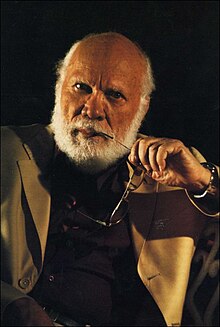| Frankétienne | |
|---|---|
 | |
| Born | (1936-04-12) April 12, 1936 (age 88) Ravine-Sèche, Haiti |
| Occupation | Writer, poet, playwright, painter, musician |
| Notable awards | Commander 'Ordre des Arts et Lettres' (2010) |
Frankétienne (born Franck Étienne on April 12, 1936, in Ravine-Sèche, Haiti) is a Haitian writer, poet, playwright, painter, musician, activist and intellectual. He is recognized as one of Haiti's leading writers and playwrights of both French and Haitian Creole, and is "known as the father of Haitian letters". As a painter, he is known for his colorful abstract works, often emphasizing the colors blue and red. He was a candidate for the Nobel Prize in Literature in 2009, made a Commander of the Ordre des Arts et Lettres (Order of the Arts and Letters), and was named UNESCO Artist for Peace in 2010.
Early life
Frankétienne was born in Ravine-Sèche, a small village in Haiti. He was abandoned by his father, a rich American industrialist, at a young age and was raised by his mother in the Bel Air neighborhood of Port-au-Prince, where she was a respected entrepreneur, owning her own business to support her eight children, managing to send him, who was the eldest, to school.
He first began writing poetry around 1960. He published his first texts in 1964 and 1965. His first novel, Mûr a créver, was published in 1968. From 1977 onward he found success in theater.
Selected works
- Au Fil du Temps, a compilation of poems
- Ultravocal, a novel
- Pèlin Tèt, a play written in Haitian Creole
- Dézafi, a novel about life during under the Duvalier regime, the first ever in Haitian Creole
- Mûr à Crever, a novel
- Les Affres d'un Défi, a novel
- Désastre (12 janvier 2010), painting
- Difficile émergence vers la lumière, painting
References
- ^ "Frankétienne". Poetry Translation Centre. Retrieved March 4, 2014.
- ^ Glover, Kaiama. "Francketienne" (PDF). Hutchins Center for African & African American Research. Archived from the original (PDF) on June 24, 2016. Retrieved March 4, 2014.
- Douglas, Rachel (June 16, 2009). Frankétienne and Rewriting: A Work in Progress. ISBN 9780739136355. Retrieved March 4, 2014.
- ^ Archibold, Randal C. (April 29, 2011). "A Prolific Father of Haitian Letters, Busier Than Ever". The New York Times. p. A5. Retrieved March 4, 2014.
- "Haitian writer Frankétienne named UNESCO Artist for Peace". United Nations. March 24, 2010.
- Taleb-Khyar, Mohamed B. (1992). "Franketienne". Callaloo. 15 (2): 385–392. doi:10.2307/2931239. ISSN 0161-2492. Retrieved April 15, 2024.
- P. Schutt-Ainé, Haiti: A Basic Reference Book, 103
External links
- Frankétienne Archived February 2, 2017, at the Wayback Machine author profile on Prince Claus Foundation site
- Île en île: Frankétienne author file (in French), with biography, bibliography, and audio
Further reading
- Douglas, Rachel (2009). Frankétienne and Rewriting: A Work in Progress. New York: Lexington Books. ISBN 978-0-739-12565-6.
- Glover, Kaiama L. (2011). Haiti Unbound: A Spiralist Challenge to the Post-Colonial Canon. Liverpool, UK: Liverpool University Press. ISBN 978-1-846-31499-5.
- Hadjadj, Bernard (2012). Frankétienne, l'universel haïtien : entretiens. Marseille: Riveneuve. ISBN 978-2-360-13099-3.
- Jonassaint, Jean (2008). Typo-topo-poéthique sur Franketienne. Paris: l'Harmattan. ISBN 978-2-296-06787-5.
- Jonassaint, Jean. "Frankétienne, Écrivain haïtien," Dérives 53/54 (1987)
- Oakley, Seanna Sumalee (2011). Common places the poetics of African Atlantic postromantics. Amsterdam: Rodopi. ISBN 978-9-042-03408-2.
- Schutt-Ainé, Patricia; Staff of Librairie Au Service de la Culture (1994). Haiti: A Basic Reference Book. Miami, Florida: Librairie Au Service de la Culture. p. 103. ISBN 0-9638599-0-0.
- Trudel, Benoît Jean-Marc (2009). L'énonciation non-rationnelle dans le roman francophone des Amériques: les stratégies socio-poétiques chez Jacques Ferron, Hubert Aquin, Édouard Glissant et Frankétienne. London, Ontario: School of Graduate and Postdoctoral Studies, University of Western Ontario.
This Haitian painter-related article is a stub. You can help Misplaced Pages by expanding it. |
This article about a Haitian writer, poet or playwright is a stub. You can help Misplaced Pages by expanding it. |
- 1936 births
- Haitian Creole-language writers
- Haitian people of American descent
- Mulatto Haitians
- 20th-century Haitian dramatists and playwrights
- Haitian male dramatists and playwrights
- Haitian male novelists
- Haitian artists
- Haitian painters
- Haitian male painters
- Haitian male poets
- Living people
- 20th-century Haitian poets
- 20th-century Haitian novelists
- 21st-century Haitian poets
- 21st-century Haitian novelists
- 20th-century Haitian male writers
- 21st-century male writers
- Haitian painter stubs
- Haitian writer stubs